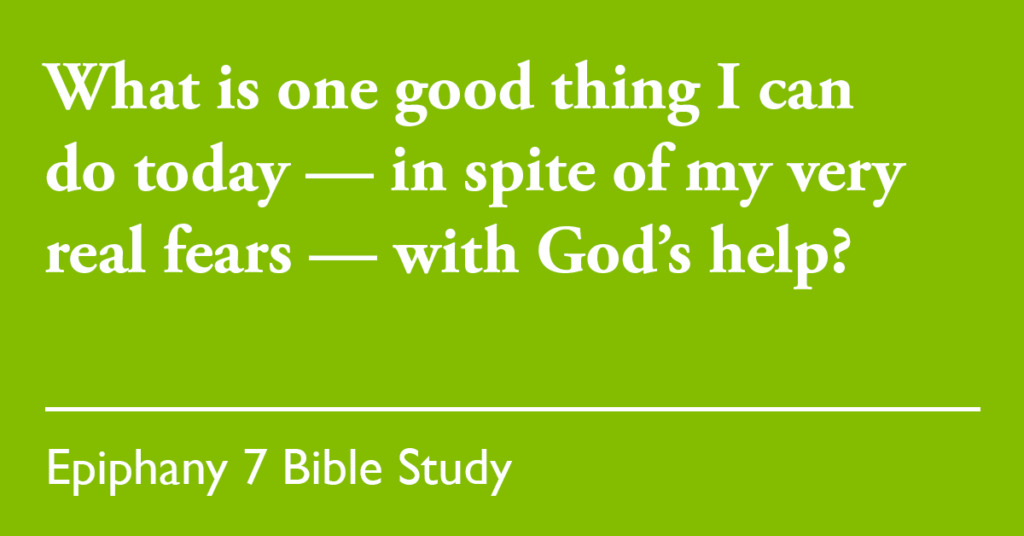Bible Study: Epiphany 7 (C) – 2022
February 20, 2022
RCL: Genesis 45:3-11, 15; Psalm 37:1-12, 41-42; 1 Corinthians 15:35-38,42-50; Luke 6:27-38

Genesis 45: 3-11, 15
This passage marks the climax of the Joseph story. In Genesis, Joseph has been betrayed by his brothers after being marked as his father’s favorite. Joseph’s family is no stranger to dysfunction: His lineage has included deception and stolen birthrights. At a tender young age, Joseph was sold into slavery and was believed to be dead. Joseph tells his brothers that God has worked the situation for the greater good: Joseph’s soft landing in the Egyptian court has actually been his family’s salvation from the famine plaguing the land. The passage ends with reconciliation between Joseph and his brothers. Perhaps we can rest in the comfort of this mending of relationships, but for those of us who come from families fraught with resentments that perhaps also climaxed this holiday season, it may not be of much comfort if we cannot see God in our suffering. We may long for this kind of reconciliation in our lives, but not find it possible. We may see suffering, and need to look for God there, as well.
- Where do we struggle to see God in our own pain and broken relationships? How are we called to be as Christians when this sort of resolution as seen in the Joseph story does not seem possible?
Psalm 37: 1-12, 41-42
In these uncertain times, with political unrest and a raging pandemic that seems to re-emerge just as we feel hope on the horizon, it may seem simplistic to be told to “put your trust in the Lord.” However, imagining the other side of this psalm may bring us some comfort in these unsettled times. We can imagine that the psalmist is responding to the fears of a person who sees the evils of this world and wonders why nothing is being done to stop them. The psalmist urges their companion to remember that God’s time may not be like ours: God is always in the present, but also tending the future we cannot see. In the meantime, the psalmist urges their friend – and us – to go about the business of goodness: keeping anger in check, trying not to fret, and doing what God asks of us.
- What is one good thing I can do today — in spite of my very real fears — with God’s help? How can I seek refuge from my fears in God, as the psalmist urges us to do?
1 Corinthians 15:35-38, 42-50
This passage can be confusing when taken out of context. While an impassioned argument for the nexus of the body and soul, it is part of a longer, ongoing debate Paul is having with the community in Corinth. While we perhaps no longer argue about the bodily resurrection, the rifts in communities of faith and even society at large are familiar to us, particularly as we look at the last several years of American politics. What Paul makes clear is that God’s plan for resurrection is nothing like our current world: what is weak is made strong, and what is considered shameful will be raised in glory. Today’s audiences may struggle with Paul’s arguments, but it should be clear to us: God’s commonwealth will surprise us with its inversion of our current systems.
- Where do I see God’s commonwealth breaking through in the current (dis)order? How does Christ invert our structures of power?
Luke 6: 27-38
What would it take to break a generational curse? A cycle of violence that stretches back through millennia? How can humans assist in the in-breaking of God’s commonwealth? The answers may be found here, in this portion of the Sermon on the Plain. But what Jesus asks of us is not easy, and in fact, may seem impossible: We are to love our enemies and do good to those who hate us. This is not about accepting abuse, but rather refusing to participate in the human cycles of vengeance and retribution. God’s economy is not transactional: Love does not write checks and keep a ledger. In the abstract, this sounds simple. However, in the real-world scenario of dog-eat-dog, this may not be as easy as it sounds. Jesus is clear, though: To be a Christian is to go against the grain. It is to step outside of our comfort zones in and into the Commonwealth of God.
- Where do I focus exclusively on welcoming those who are already familiar to me? Where do I need to be uncomfortable and go with God into the unfamiliar? Where can forgiveness of a person or situation release me from a cycle of fear and suffering?
¡No olvide suscribirse al podcast Sermons That Work para escuchar este sermón y más en su aplicación de podcasting favorita! Las grabaciones se publican el jueves antes de cada fecha litúrgica.


